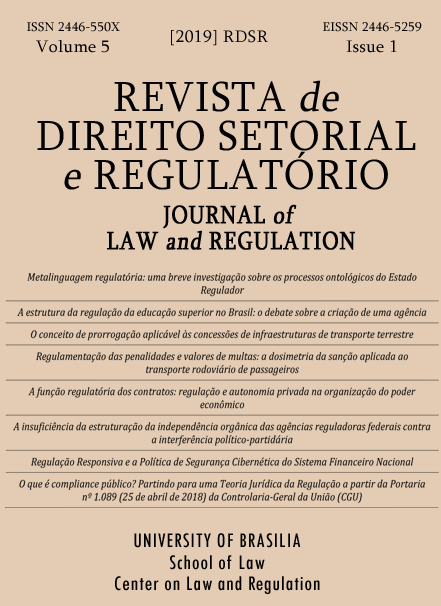Regulatory Metalanguage: A Brief Inquiry into the Ontological Processes of the Regulatory State
Palabras clave:
anti-nature, naturalist fallacy, market, Regulatory State, metalanguageResumen
Purpose ”“ This paper consists in a philosophic research on the ontological doctrines of naturalism and non-naturalism, which we find essential to the description of the ways we can perceive existence, in order to draw a diametrical bridge into the realm of legal disciplines and market protective practices, especially regarding the general rules of state regulation, taking as historical and political milestones three distinct economic times: the Liberal State, the Welfare State and the Regulatory State, the latter one which culminates in the virtually global design for autonomous hetero-regulated economy present in the capitalist State.
Methodology/approach/design ”“ Considering that any language used to describe the phenomena which we can roughly call reality is produced from a metalanguage, and therefore, prior to the description of these phenomena, the following analysis aims to clarify what is (or what ought to be) the metalanguage responsible for the genesis of the regulatory phenomenon and its logical-epistemological limits. It is an interdisciplinary research conducted by analyzing and comparing the works of Philosophy authors, as Hume and Rosset, and Economic Theory authors, as Smith, Keynes and Hayek.
Findings ”“ After the systematic consideration of the concepts, we argue that there are no necessary ontological instances that determine the discovery of a special natural order to the market, which is why any thecné that claims to be genuinely regulatory must remain in the field of contingency, which is also the domain of politics. We think it is imperative that legal fields currently put closer to the technological sciences take a step back into their humanistic origins to (re)discover their social features and therefore the importance of subjectivity in making sense of their fundamental role.
Descargas
Citas
CARVALHO, C. E. V. D. Regulação de serviços públicos: na perspectiva da constituição econômica brasileira. São Paulo: Del Rey, 2007.
DELEUZE, G. Spinoza: filosofía práctica. Barcelona: Tusquets, 2001.
GONÇALVES, R. C. A distinção metaética entre dever e desejar e a questão da normatividade dos atos morais. Prim@ Facie, João Pessoa, 10, n. 19, jul-dez 2011. 165-175.
GRAMSCI, A. Americanismo e fordismo. In: ______ Obras escolhidas. São Paulo: Martins Fontes, 1978.
GRAU, E. R. Direito posto e direito pressuposto. 7. ed. São Paulo: Malheiros, 2008.
HAYEK, F. A. O caminho da servidão. São Paulo: Instituto Ludwig Von Mises Brasil, 2010.
HUME, D. A treatise of human nature. Oxford/New York: Oxford University Press, 2000.
KEYNES, J. M. The general theory of employment, interest and money. New York: Macmillan Cambridge University Press, 1980.
MAQUIAVEL, N. O príncipe. São Paulo: Rideel, 2003.
QUESNAY, F. Quadro econômico dos fisiocratas. Tradução de João Guilherme Vargas Netto. São Paulo: Abril Cultural, 1983.
ROSSET, C. Anti-natureza: elementos para uma filosofia trágica. Rio de Janeiro: Espaço e Tempo, 1989.
SMITH, A. The theory of moral sentiments. Oxford: Oxford University Press, 1978.
______. A riqueza das nações: investigação sobre sua natureza e suas causas. Tradução de Luiz João Baraúna. São Paulo: Nova Cultural, v. 1, 1996.
SOUZA, W. P. A. D. Teoria da constituição econômica. Belo Horizonte: Del Rey, 2002.
WEBER, M. A ética protestante e o "espírito" do capitalismo. Tradução de José Marcos Mariani de Macedo. 6. ed. São Paulo: Companhia das Letras, 2004.
ZWEIG, S. Brasil: um país do futuro. São Paulo: L&PM , 2006.
Descargas
Publicado
Cómo citar
Número
Sección
Licencia
Al enviar este documento a la Revista de Derecho, Estado y Telecomunicaciones, declaro que estoy aceptando los términos de Creative Commons Attribution 4.0 International (CC BY 4.0), disponible en http://creativecommons.org/licenses/by/4.0.


